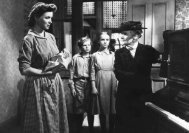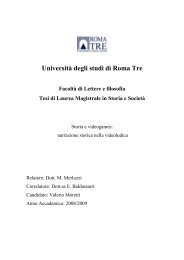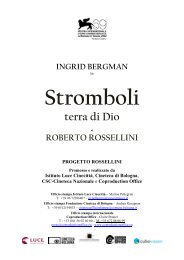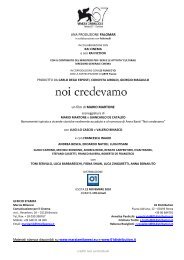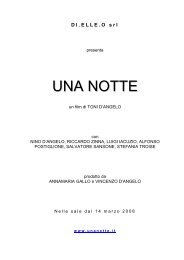Catalogo 1999 - Cineteca di Bologna
Catalogo 1999 - Cineteca di Bologna
Catalogo 1999 - Cineteca di Bologna
You also want an ePaper? Increase the reach of your titles
YUMPU automatically turns print PDFs into web optimized ePapers that Google loves.
Divine apparizioni / Divine apparitions - Henny Porten<br />
MEIßNER PORZELLAN (Germania, 1906). R.: Franz Porten. F.: Carl Froelich. M.: Salon-Gavotte<br />
von Carl Alfredy. Text: Leo Herzberg. In.: Henny Porten (Kavalier), Rosa Porten (Dame). P.: Messters<br />
Projektion GmbH, Berlino. Pd.: Oskar Messter.<br />
35mm. L.: 81m. D.: 5’a 16 f/s. Senza <strong>di</strong>dascalie / Without intertitles.<br />
Da: Bundesarchiv Filmarchiv per concessione della Murnau Stiftung<br />
Accompagnamento musicale <strong>di</strong> / Musical accompaniment by Deborah Silberer<br />
Non vi è dubbio che Henny Porten fosse l’astro del cinema muto tedesco, una megastar <strong>di</strong> una popolarità senza pari: “Ci si trova <strong>di</strong> fronte a una figura egualmente conosciuta e<br />
amata dagli appartenenti a ogni schieramento partitico, a ogni classe <strong>di</strong> età, a ogni ceto e con<strong>di</strong>zione sociale”, così la esalta Kurt Pinthus nel 1921, “una figura così popolare in<br />
Germania come non lo sono mai stati, né avrebbero potuto esserlo, l’imperatore, il ‘vecchio Fritz’, o l’olimpico Goethe”. Da questo stato <strong>di</strong> cose si dovrebbe trarre una logica<br />
conclusione, <strong>di</strong>ce, e avanza la proposta “per metà seria, per metà faceta “: “Si proclami Henny Porten presidente del Reich! Come brilerebbe alora sul capo <strong>di</strong> tuti i popoli questa<br />
scelta quale simbolo dela natura pacifica del popolo tedesco!”<br />
La gloria postuma della Porten sta in rapporto <strong>di</strong>ametralmente opposto al favore <strong>di</strong> cui godette presso i<br />
suoi contemporanei. Ciò che un tempo, fra le altre cose, fece grande la star Porten con il suo enorme<br />
potenziale <strong>di</strong> identificazione e integrazione, è quanto in seguito la rese sospetta, ossia quell’aggettivo<br />
tanto pregnante quanto bolso con cui ella venne sempre caratterizzata: star “tedesca”.<br />
Nela sua qualità <strong>di</strong> prima, significativa star cinematografica “tedesca”, Henny Porten assurse a simbolo del’ascesa del cinema tout court, forma <strong>di</strong> intratenimento che era stata<br />
tenacemente strappata ala grande cultura e ai gran<strong>di</strong> percorsi <strong>di</strong> formazione. Altri elementi <strong>di</strong> affezione si sovrapponevano al’immagine concreta sulo schermo: “Con mia sorela,<br />
più piccola <strong>di</strong> me, correvo ovunque si potesse veder recitare la nostra amata Henny. Ridevamo a crepapele <strong>di</strong> lei” (Haas 1960). Al leterato Béla Balász ancora negli anni venti<br />
l’entusiasmo dei fan appariva come un fenomeno ormai superato e tutavia affermava non senza ammirazione: “le intrepide protagoniste <strong>di</strong> questa prima, eroica epoca dela<br />
nuova arte sono <strong>di</strong>ventate leggenda nela fantasia popolare. Asta Nielsen, Pola Negri, Henny Porten, Mia May sono <strong>di</strong>ventate il simbolo dela gioventù e del’amore romantico”<br />
(Der Tag, 18.11.1924). (Corinna Müler, in Hans-Michael Bock (Hg.), Cinegraph. Lexikon des deutschsprachigen Films, 1984)<br />
Without a doubt: Henny Porten was the star of the German silent film, a mega-star of unparalleled<br />
popularity. “Here’s a figure who is equally well-known and loved among members of all parties, young<br />
and old, of all social classes and strata”, Kurt Pinthus extolled in 1921, “who is more popular with<br />
people in Germany than Old Fritz or the Olympian Goethe ever were or could ever be”. And<br />
accor<strong>di</strong>ngly he demanded, “half seriously, half ironically”, “Henny Porten for President of the Reich!<br />
How this choice would shine over all the nations of this earth as a symbol of the Germans’<br />
peaceableness”.<br />
Henny Porten’s posthumous reputation is <strong>di</strong>ametrically opposed to her popularity during her lifetime.<br />
What once made Porten, with her enormous potential for identification and integration, a great star,<br />
although it later made her suspect, was the adjective “German” with which she was repeatedly<br />
characterised, and which is as vague as it is succinct.<br />
As the first notable “German” film star, Henny Porten stood for the actual rise of cinema in Germany,<br />
for a pleasure obstinately wrested from a high culture that inclined more towards literature and<br />
learning. A concrete screen image became overlaid with other aspects of affection - “I ran with my<br />
little sister to wherever our beloved Henny was showing. We laughed ourselves silly at her.” (Haas,<br />
1960). The writer Béla Balázs found her fans’ continued sympathy in the 1920s a little behind the<br />
times, but states, not without admiration, that “the heroines of this first heroic era of the new art<br />
became legends in the people’s imagination. Asta Nielsen, Pola Negri, Henny Porten, Mia May,<br />
became symbols of youth and romantic love.” (Der Tag, 18.11.1924). (Corinna Müller, in Hans-<br />
Michael Bock (Hg.), Cinegraph. Lexikon des deutschsprachig en Films, 1984)






